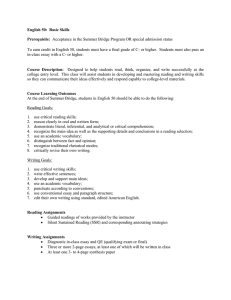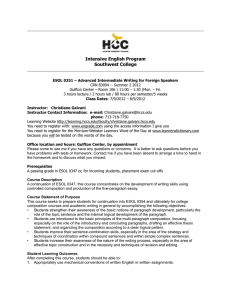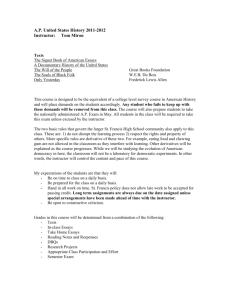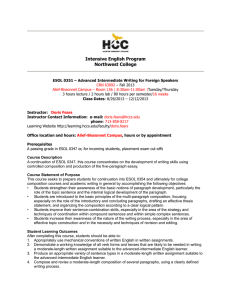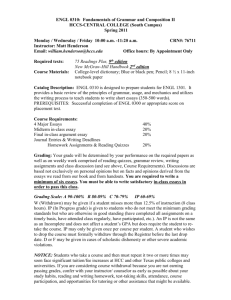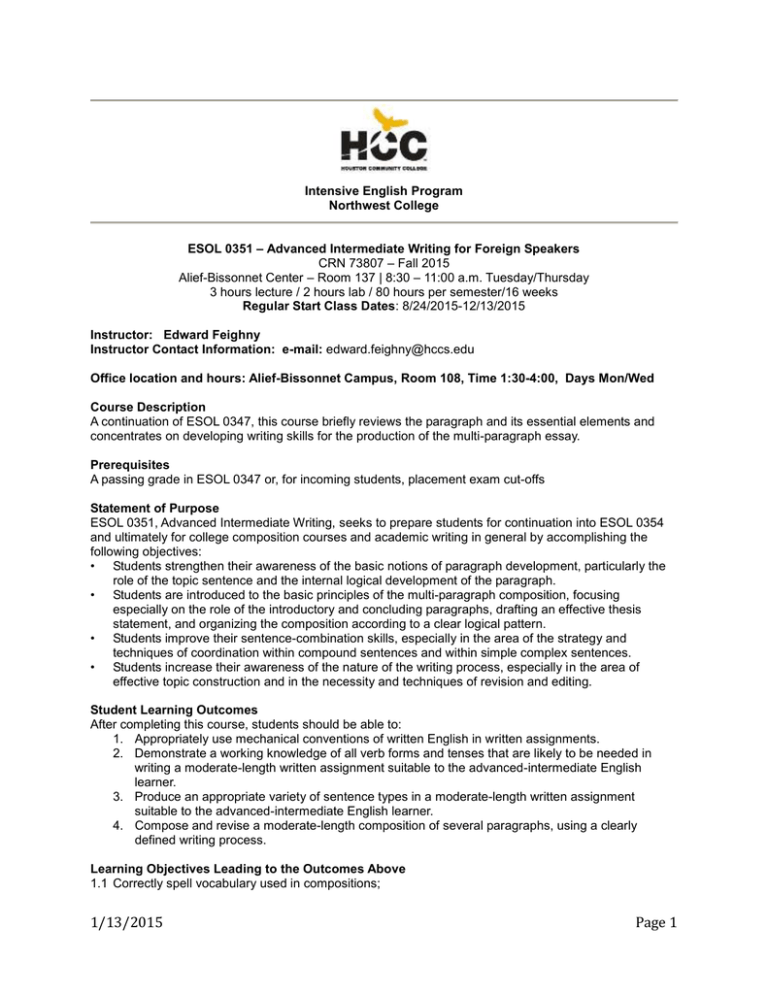
Intensive English Program
Northwest College
ESOL 0351 – Advanced Intermediate Writing for Foreign Speakers
CRN 73807 – Fall 2015
Alief-Bissonnet Center – Room 137 | 8:30 – 11:00 a.m. Tuesday/Thursday
3 hours lecture / 2 hours lab / 80 hours per semester/16 weeks
Regular Start Class Dates: 8/24/2015-12/13/2015
Instructor: Edward Feighny
Instructor Contact Information: e-mail: edward.feighny@hccs.edu
Office location and hours: Alief-Bissonnet Campus, Room 108, Time 1:30-4:00, Days Mon/Wed
Course Description
A continuation of ESOL 0347, this course briefly reviews the paragraph and its essential elements and
concentrates on developing writing skills for the production of the multi-paragraph essay.
Prerequisites
A passing grade in ESOL 0347 or, for incoming students, placement exam cut-offs
Statement of Purpose
ESOL 0351, Advanced Intermediate Writing, seeks to prepare students for continuation into ESOL 0354
and ultimately for college composition courses and academic writing in general by accomplishing the
following objectives:
• Students strengthen their awareness of the basic notions of paragraph development, particularly the
role of the topic sentence and the internal logical development of the paragraph.
• Students are introduced to the basic principles of the multi-paragraph composition, focusing
especially on the role of the introductory and concluding paragraphs, drafting an effective thesis
statement, and organizing the composition according to a clear logical pattern.
• Students improve their sentence-combination skills, especially in the area of the strategy and
techniques of coordination within compound sentences and within simple complex sentences.
• Students increase their awareness of the nature of the writing process, especially in the area of
effective topic construction and in the necessity and techniques of revision and editing.
Student Learning Outcomes
After completing this course, students should be able to:
1. Appropriately use mechanical conventions of written English in written assignments.
2. Demonstrate a working knowledge of all verb forms and tenses that are likely to be needed in
writing a moderate-length written assignment suitable to the advanced-intermediate English
learner.
3. Produce an appropriate variety of sentence types in a moderate-length written assignment
suitable to the advanced-intermediate English learner.
4. Compose and revise a moderate-length composition of several paragraphs, using a clearly
defined writing process.
Learning Objectives Leading to the Outcomes Above
1.1 Correctly spell vocabulary used in compositions;
1/13/2015
Page 1
1.2 Apply rules for capitalization of beginning of sentences, proper names and other proper nouns (e.g.
cities, countries, regions, holidays, etc.);
1.3 Apply punctuation rules, especially including end punctuation (periods, question marks, exclamation
points), commas and semicolons.
2.1 Appropriately use a variety of simple, progressive, and perfect verb tenses, based on the context of
the discourse, in written assignments;
2.2 Appropriately use gerunds and infinitives as appropriate to discourse context in written assignments.
3.1 Produce compound sentences, using the seven coordinating conjunctions as well as conjunctive
adverb sentence connectors;
3.2 Produce complex sentences using a variety of subordinating conjunctions appropriate to the
discourse context, with correct punctuation;
3.3 Produce complex sentences using well-formed adjective (relative) clauses;
3.4 Produce complex sentences using well-formed noun clauses.
4.1
4.2
4.3
4.4
Use prewriting strategies to generate a topic to write about, along with supporting ideas;
Write a limited and clear thesis statement;
Organize a draft by preparing a well-formatted outline;
Write a draft of a multi-paragraph essay of 200-300 words, with a clear thesis in the introductory
paragraph and a concluding paragraph;
4.5 Revise the composition after receiving both peer feedback and feedback from the instructor.
ESOL 0351, Advanced Intermediate Composition, Sample Course Outlines
Sample 16-Week Course Outline
Ready to Write 3, Third Edition 0-13-136334-4
Week 1
Week 2
Week 3
Introduction, orientation, diagnostics
Chapter 1: Getting Ready to Write
Chapter 1: Getting Ready to Write
p. 2
p. 25
Week 4
Chapter 2: Writing Paragraphs
In-class Paragraph 1
Chapter 3: Revising and Editing
Week 5
Chapter 4: Writing Essays
p. 67
Week 6
Chapter 6: Division and Classification Essays
p. 99
Week 7
Chapter 6: Division and Classification Essays
In-class Essay 1 (Division/Classification)
Chapter 7: Cause and Effect Essay
p. 111
Chapter 7: Cause and Effect Essay
In-class Essay 2 (Cause/Effect)
Chapter 8: Comparison and Contrast Essay
p. 125
Chapter 8: Comparison and Contrast Essay
In-class Essay 3 (Comparison/Contrast)
Chapter 9: Problem-Solution
p. 138
Chapter 9: Problem-Solution
In-Class Essay 4 (Problem-Solution)
Chapter 10: Writing Summaries
p. 152
Week 8
Week 9
Week 10
Week 11
Week 12
Week 13
Week 14
1/13/2015
p. 47
Page 2
Week 15
Week 16
Chapter 10: Writing Summaries
Review for Final Examination
Final Examination
(The instructor may change this calendar if needed)
Instructional Methods
Student writing of different kinds such as essays, summaries, timed writing for fluency, and dictations
Class or group writing of outlines and essays
Individual writing of essays
Reading and analyzing paragraphs and essays to see how they are constructed
Exercises on pre-writing skills such as generating, developing and organizing ideas
Activities on grammar and vocabulary needed for a particular kind of essay
Activities on sentence types
Activities on revising an essay for content and other errors and ways to correct them
Revising and rewriting teacher-corrected compositions
Peer editing of outlines and essays
Individual conferences for essays
Lecture and discussion (whole-class, groups, or pairs)
Activities in the textbook, on handouts, or online
Basic Requirements for ESOL 0351
Students in 0351 will fulfill the following requirements:
A minimum of 5 graded compositions done in class. A maximum of one can be a graded single
paragraph (75-100 words). The rest, or all, will be multi-paragraph essays (200-300 words)
including the final examination.
The following rhetorical organizations are to be covered, including in the final examination:
Process
Division and classification
Comparison/contrast
Causes and effects
Problem/solution
Students are required to revise and rewrite their in-class compositions (excluding the midterm and
final compositions). Students are encouraged to take the revision process seriously.
Students should do regular and frequent alternative free writing activities which will be inspected
regularly by the instructor. This may take various forms such as a journal, summaries, etc.
Student Assignments
Journals or other weekly writing assignments
Writing or completing work covered in class such as revising essays, writing outlines, or writing essays in
whole or in part
Students will rewrite in-class essays using teacher feedback.
Assessment Methods
Five in-class compositions (and revisions) and the final composition
Homework/Practice compositions, homework exercises, other writing assignments
Quizzes work covered in class. There will be regular quizzes (some unannounced) over homework or
topics we have been studying.
Electronic devices are not allowed in writing tests and quizzes.
Automatic failure on final exam: Fewer than 150 words, off topic, no thesis statement or topic sentences,
or all simple sentences
INSTRUCTOR’S REQUIREMENTS
The teacher needs to:
Create a rich learning environment for writing and student interaction.
1/13/2015
Page 3
Give students extra reading in class and in lab on topics connected to the course
Make classes, projects, tests, assignments, policies, dates, and regulations clear.
Tell students about important HCC policies such as attendance and academic honesty (no
cheating).
Make arrangements to be available to students when they need help or have questions.
Give help when needed
Provide grading scales and assessment.
Make a class calendar available.
To succeed in college the students need to:
Work hard, attend all classes, and be on time. Good attendance + hard work = SUCCESS
If you are absent for all or part of a class, you are responsible for contacting the instructor as
soon as possible to find out what you missed and to find out if the work can be made up.
Pay attention, listen carefully and ask questions. Listen and be respectful to other students’
contributions.
Create a good learning environment. Turn off cell phones or use vibrate mode for emergencies.
No Texting in class.
Concentrate. Use English only in class time and sit next to someone who doesn’t speak your
language.
Eat well for energy. The brain needs good food. Eat breakfast at home and lunch in break times.
Do homework. The brain learns by seeing new words and ideas many times in different ways.
Do your own work and learn. Copying from the Internet and other sources is not learning.
Have fun with English.
Read, write, listen and speak English in daily life through TV, neighbors, students and coworkers,
and volunteering in the community.
Use technology for learning on-line in English learning sites.
Late assignments: If homework is one day late without a reason that is acceptable to your instructor, the
grade will go down 25 points. Two days late = 50 points down. Late assignments will not be accepted
after the second day. If you miss classwork, you cannot receive full credit for making it up. Assignments
are due at the beginning of class. If they are turned in after that, they are late.
Missed examinations or quizzes: Please do not be absent on in-class essay days. Missed
examinations or quizzes can be made up only if you can provide what your instructor considers an
acceptable reason for having a second chance. Missed assignments must be made-up on the day you
return to class. It is your
Classroom behavior: Treat your classmates and teacher with respect. Use English. Make the most of
your class time by actively participating in discussions and activities. Do not speak while the instructor or
another student is speaking to the class. Put your cell phone on silent. If you are expecting an emergency
call, ask for your instructor’s permission to leave your cell phone on vibrate. No texting or listening to
music during class. You may not use phones/electronic dictionaries during in-class writing assignments.
Violations of these rules can lead to points deducted from your final grade or removal from the classroom.
HCC Grading Scale
90-100% =A 80 – 89% = B
70 – 79% = C
Suggested Grading Percentages*
In-Class Essays
In-Class Paragraph
Journals/Quizzes
Homework/Classwork
Final Exam
Below 70% = IP (In Progress) or F (not passing)
45%
10%
15%
10%
20%
Instructional Materials
Ready to Write 3, 3rd edition, Blanchard and Root; Pearson Longman Publishers
1/13/2015
(Required)
Page 4
The Newbury House Dictionary of American English (w/CD), 4th ed.
(Optional)
HCC Policy: Scholastic Dishonesty (Dishonesty = Cheating)
Students are responsible for conducting themselves with honor and integrity in fulfilling course
requirements. Penalties and/ or disciplinary proceedings may be initiated by college district officials
against a student accused of scholastic dishonesty. “Scholastic Dishonesty” includes, but is not limited to,
cheating on a test, plagiarism and collusion. Possible punishments for academic dishonesty may include
a grade of “0” or “F” on the particular assignment, failure in the course, and/or referral to the college Dean
of Student Services for disciplinary action up to and including expulsion. Students have the right to appeal
the decision.
Plagiarism means the appropriation of another’s work and the unacknowledged incorporation of that work
in one’s own written work offered for credit.
Collusion means the unauthorized collaboration with another person in preparing written work offered for
credit.
HCC Policy: Attendance
You are expected to attend all lecture classes and labs regularly. You are also responsible for materials
covered during your absences. Instructors may be willing to consult with you for make-up assignments,
but it is your responsibility to contact the instructor. Class attendance is monitored daily. Although it is
your responsibility to drop a course for nonattendance, the instructor has the authority to drop you for
excessive absences. You may be dropped from a course after accumulating absences in excess of 12.5
percent of the total hours of instruction (lecture and lab). For Intensive English if you exceed a total of 10
hours (12.5%) of absence in any class, you can be dropped from all Intensive English classes. This will
make F1 students out of status and cause visa problems. Administrative drops are at the discretion of the
instructor. Failure to withdraw officially can result in a grade of “F” in the course.
HCC Policy: Withdrawal Deadline
Students must withdraw by the withdrawal deadline in order to receive a “W” on a transcript. Be certain
you understand HCC policies about dropping a course and consult with a counselor/advisor to determine
if withdrawing is in your best interest. It is your responsibility to withdraw officially from a class and
prevent an “F” from appearing on your transcript. In addition, withdrawing from a course may impact your
financial aid award or eligibility. Contact the Financial Aid Office or website to learn more about the impact
of withdrawing on financial aid. To drop a class, you must speak with a counselor or an advisor. The last
day students may withdraw or be dropped from a class with a grade of W is October 30, 2015. Students
who have excessive absences after that date will receive the grades they earn. Note: International
students will be out of status if they drop or are dropped from their classes and may have to
return to their countries.
HCC Policy: Students Repeating a Course for the Third Time
Please be advised that HCC is charging additional tuition for students who enroll in the same class three
or more times at HCC. While it is the hope of HCC that students will be successful in their first attempt at
classes, we realize that life demands, academic struggles, and other issues may result in students
needing to take the same class more than once. Speaking with an advisor will help you develop student
success skills, improving your overall academic performance. If a student repeats a course in which a
grade (A-F) has been received, the highest grade received at HCC is the permanent grade for the course
and will be used in computing the GPA. All grades earned in a given course will be reflected on the
transcript. Grades of IP or F are failing grades; the student will have to repeat the course. A student who
fails a class for the second time must receive a grade of F for that class. If you are having trouble in class,
talk to your teacher and get help from a tutor.
HCC Policy – ADA -- Disability Support Services
Houston Community College is committed to providing an accessible and supportive environment for
students with disabilities. The Disability Support Service Office (DSSO) at each college of the Houston
Community College is responsible for arranging reasonable accommodations for all qualified students
with documented disabilities to ensure equal access to all programs and activities at HCC. DSSO assists
students with physical, learning or emotional disabilities in developing independence and self reliance.
1/13/2015
Page 5
Services include adaptive equipment and reasonable accommodations for admissions assistance,
testing, academic advising, registration and classroom instruction. Interpreting services are available for
students who are deaf/hard-of-hearing and assistive technology devices are available for students who
are blind. In order to serve you better, ADA counselors recommend that you meet with them at least
60 days prior to the beginning of the term. Students attending Northwest College are encouraged to
contact Dr. LaRonda Ashford at 713-718-5408 to make necessary arrangements. Faculty is only
authorized to provide accommodations by the Disability Support Service Office. Please see this website
for more information: For more information visit http://www.hccs.edu/hccs/future-students/disabilityservices
HCC Policy on Sexual Harassment
HCC will provide an educational, employment and business environment free of sexual harassment.
Sexual harassment is a form of sex discrimination and is not tolerated by HCC. Any student who feels
that he or she is the victim of sexual harassment has the right to file a grievance. Substantiated
accusations may result in disciplinary action against the offender, up to and including termination of the
employee or suspension of the student. In addition, complainants who make accusations of sexual
harassment in bad faith may be subject to appropriate disciplinary action.
Use of Camera and/or Recording Devices
Use of recording devices, including camera phones and tape recorders, is prohibited in classrooms,
laboratories, faculty offices, and other locations where instruction, tutoring, or testing occurs. Students
with disabilities who need to use a recording device as a reasonable accommodation should contact the
Office for Students with Disabilities for information regarding reasonable accommodations.
Misuse of Electronic Devices in the Classroom
The use of electronic devices by students in the classroom is up to the discretion of the instructor. Any
use of such devices for purposes other than student learning is strictly prohibited. If an instructor
perceives such use as disruptive and/or inappropriate, the instructor has the right to terminate such use. If
the behavior continues, the student may be subject to disciplinary action to include removal from the
classroom or referral to the Dean of Student Services.
Student Code of Conduct
Houston Community College views college-level students as adults who subscribe to a basic standard of
conduct, which requires that they not violate any municipal, state or federal laws. Furthermore, no student
may disrupt or otherwise interfere with any educational activity or fellow students’ right to pursue
academic goals to the fullest in an atmosphere appropriate to a community of scholars. Any student
failing to abide by appropriate standards of conduct during scheduled college activities may result in
disciplinary action. Students suspected of violating the student code of conduct will be subject to the
disciplinary process. Students have the right to due process. For detailed information regarding violations
of the student code of conduct and the disciplinary and appeal process, visit www.hccs.edu/hccs/currentstudents/student-rights-policiesprocedures
General Instructional Complaints
When a student wishes to file a complaint related to instructional matters not covered under the Grade
Appeal or EEO Process, the student is to follow the chain of command. A student should first discuss the
issue with the faculty member. If after having discussed the matter with the faculty member a resolution is
not reached to the student’s satisfaction, the student may then present the issue to the
division/department chair. If the student is still dissatisfied with the outcome after having spoken to the
division/department chair, he/she may direct the complaint to the appropriate dean. The dean’s decision is
final. Complaints must be made within the semester in which the issue arose.
EGLS3: Evaluation for Greater Learning Student Survey System
At Houston Community College, professors believe that thoughtful student feedback is necessary to
improve teaching and learning. During a designated time, you will be asked to answer a short online
survey of research-based questions related to instruction. The anonymous results of the survey will be
made available to your professors and division chairs for continual improvement of instruction. Look for
the survey as part of the Houston Community College Student System online near the end of the term.
1/13/2015
Page 6
Important Dates and Holidays
IEP Classes Begin
Labor Day Holiday
Official Date of Record
Last Day for Administrative/Student Withdrawals
Thanksgiving Holiday
Last Day of IEP Classes
1/13/2015
August 24, 2015
September 7, 2015
September 8, 2015
October 30, 2015
November 26-27, 2015
December 6, 2015
Page 7

